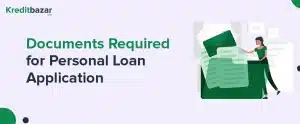![]()
Freelancing has quickly become a popular career choice in India, with more professionals choosing the flexibility and independence that comes with it. Fields like graphic design, digital marketing, content writing, and software development are thriving with freelance talent, and these professionals now form an essential part of India’s workforce. However, freelancing also brings unique financial challenges, particularly regarding access to credit. Since freelancers do not have fixed monthly incomes, traditional lenders often hesitate to extend loans to them, which can make meeting financial needs more difficult.
For freelancers, personal loans can be incredibly beneficial. They may need funds to invest in new equipment, expand their business, or handle unforeseen expenses. A personal loan offers the flexibility and convenience that self-employed individuals require, enabling them to manage expenses smoothly without compromising their work or lifestyle.
Unlike salaried employees, freelancers don’t always have consistent monthly income or employer-provided documentation, making the loan approval process harder. Banks and traditional lenders typically require stable income proof, salary slips, and employer verification—documents freelancers often lack. This gap can result in rejection or high interest rates for freelancers seeking loans.
This guide aims to empower freelancers with knowledge about personal loan eligibility, the step-by-step application process, and useful tips to increase approval chances. It serves as a valuable resource, addressing the unique challenges freelancers face and offering solutions for securing personal loans.
Table of Contents
Understanding Personal Loans for Freelancers
A personal loan is an unsecured loan, meaning it doesn’t require collateral such as property or assets. It provides quick and easy access to funds, with the flexibility to use the loan amount for various purposes, such as debt consolidation, personal expenses, or business-related costs. Since it’s an unsecured loan, approval depends heavily on factors like credit score, income stability, and debt-to-income ratio.
Why Freelancers May Need Personal Loans
There are several situations where freelancers might benefit from a personal loan, including:
- Purchasing Professional Equipment: Many freelancers rely on high-quality equipment or software to run their business. Upgrading or purchasing new tools can be expensive.
- Managing Cash Flow: Freelancing income can be irregular. A personal loan can cover monthly expenses during lean periods, ensuring stability.
- Covering Personal Expenses: Freelancers often need funds for personal expenses, whether it’s for medical emergencies, travel, or home renovations.
- Business Expansion: Freelancers who want to grow their business—by hiring subcontractors, advertising, or renting office space—may require extra capital.
Eligibility Criteria for Freelancers Applying for Personal Loans
When applying for a personal loan, freelancers need to meet certain basic eligibility criteria similar to salaried individuals. Here are some common requirements:
- Age: Most lenders require applicants to be between 21 and 60 years old. Freelancers within this age range are likely to be eligible, provided they meet other conditions.
- Citizenship: Only Indian residents are eligible for most personal loans in India.
- Minimum Income Criteria: While salaried individuals can show monthly payslips, freelancers may be required to prove minimum monthly or annual income through other documentation, such as bank statements or income tax returns.
Proof of Income Challenges for Freelancers
One major challenge freelancers face when applying for personal loans is providing adequate proof of income. Unlike salaried employees, freelancers don’t receive fixed monthly income or formal salary slips, which are typically required by lenders. Instead, freelancers might need to present alternative income proof like:
- Bank Statements: A record of regular deposits over a period (usually 6-12 months).
- Income Tax Returns (ITR): Filing ITRs for at least the past two years can serve as evidence of income stability.
- Client Invoices or Contracts: Ongoing contracts or past invoices can indicate a steady stream of work.
These documents can strengthen a freelancer’s loan application by demonstrating financial reliability, even without conventional salary proof.
Credit Score as a Key Factor
For freelancers, a high credit score can be crucial in securing a personal loan. Since freelancers lack steady income documentation, lenders may place more emphasis on the applicant’s credit history. A credit score of 750 or higher generally improves the chances of loan approval and may even result in lower interest rates.
- Importance of Credit Score: A good credit score indicates responsible financial behaviour, which lenders find attractive.
- Tips for Maintaining a Good Credit Score:
- Pay Bills on Time: Timely bill payments, including credit card dues and existing loans, positively impact your score.
- Monitor Your Credit Report: Regularly check your credit report to correct any discrepancies or errors.
- Limit Credit Utilization: Keep your credit card balances low and avoid maxing out your limits.
- Avoid Frequent Loan Applications: Multiple loan applications in a short period can lower your credit score, as it may indicate financial stress.
SEO Keywords: freelancer loan eligibility, credit score for freelancer loan, personal loan eligibility for freelancers
Documents Required for Freelancers to Secure a Personal Loan
Securing a personal loan as a freelancer requires specific documentation to assure lenders of income stability and identity. Unlike salaried employees, freelancers may need to present alternative documents to meet eligibility requirements, as traditional income verification may not apply. Here’s a breakdown of essential documents for freelancers.
Primary Documents
To establish identity and address, freelancers need to provide these standard documents:
- Identity Proof: Valid documents include an Aadhaar Card, Passport, or Voter ID.
- Address Proof: Utility bills, rental agreements, or a passport are commonly accepted. These documents verify that the applicant is an Indian resident and provide stability credentials.
Alternative Income Proof Documents
Freelancers must often rely on alternative proofs of income due to irregular monthly earnings. Here are the most accepted documents to substantiate income stability:
- Bank Statements: A history of consistent cash flow in the form of monthly bank statements (6-12 months) can showcase earning patterns and income frequency.
- Income Tax Returns (ITR): Filing ITRs for the last two years is valuable, as it demonstrates regular income and tax compliance, which can strengthen the application.
- Business Invoices or Contracts: Documents showing ongoing projects, completed contracts, or recent invoices provide lenders with evidence of ongoing income potential and client trust.
Optional Documents to Strengthen Application
To improve their chances of approval, freelancers can also provide:
- Financial Investments or Fixed Deposits: Showing investments or FD ownership can indicate financial responsibility.
- Ownership of Business Assets: Evidence of business assets, like vehicles or machinery, demonstrates stability and business establishment.
Step-by-Step Guide for Freelancers to Apply for a Personal Loan
This step-by-step guide will help freelancers streamline their personal loan application process, from evaluating needs to document verification.
Step 1: Evaluate Your Loan Needs and Budget
Assess how much funding you need and calculate a monthly budget to determine affordable EMIs. Make sure that the EMI fits within your cash flow to avoid financial stress.
Step 2: Research Lenders with Freelancer-Friendly Policies
Look for lenders who are open to freelancer loan applications and have flexible requirements, such as NBFCs and fintech companies. Such lenders often accommodate alternative income proofs and offer quicker approval.
Step 3: Check Your Credit Score and Report
Your credit score plays a crucial role in personal loan approval. Use online credit report services to access your score. If it’s low, try boosting it by:
- Paying down existing debts.
- Avoiding multiple credit applications in a short period.
- Ensuring timely payments on credit cards or bills.
Step 4: Gather Required Documents and Alternatives to Income Proof
As a freelancer, have all the necessary documents ready to support your application. Prepare bank statements, ITRs, and client contracts to satisfy lender requirements.
Step 5: Apply Online or Offline Based on Convenience
Most lenders offer online application portals where you can fill out forms, upload documents, and complete verification digitally. For those who prefer in-person interaction, visiting a branch can provide personalized assistance.
Step 6: Verification and Approval Process
Once submitted, lenders will verify documents, which may involve checking bank statements, income history, and identification proof. Approval time varies but typically ranges from a few days to a week.
Best Lenders for Freelancers Seeking Personal Loans
Selecting the right lender is essential for freelancers, as some institutions are more freelancer-friendly than others. Here’s an overview of the best options:
Banks Offering Flexible Loan Options for Freelancers
Certain Indian banks cater to freelancers with relaxed criteria or specialized loan products. Bank of Baroda, HDFC Bank, and SBI are among the banks offering products that may suit freelancers’ needs, though criteria vary.
NBFCs and Fintech Lenders
For freelancers, NBFCs and fintech companies can be ideal as they often have flexible eligibility criteria. Companies like Kreditbazar work with NBFCs to provide freelancer-friendly loans, offering streamlined approval and flexible documentation requirements.
Peer-to-Peer Lending Platforms
For freelancers facing challenges with traditional lenders, peer-to-peer (P2P) lending platforms offer a viable alternative. Platforms like Faircent, i2iFunding, and LenDenClub connect borrowers with individual lenders, often providing faster approvals and a simplified application process.
Factors That Can Affect Loan Approval for Freelancers
When applying for a personal loan as a freelancer, several factors come into play. Understanding these can help applicants better prepare, making the process smoother and increasing approval chances.
Credit Score Impact
A high credit score is essential in determining loan eligibility and influences the interest rates offered. Freelancers with a good credit history are more likely to get approval and benefit from lower interest rates. Tips for maintaining a good credit score include timely bill payments and keeping credit card usage within limits.
Monthly Cash Flow and Business Stability
A steady monthly cash flow strengthens a freelancer’s loan application. Regular bank deposits, reflecting consistent income, provide a favourable impression to lenders. Lenders prefer applicants who can demonstrate stable earnings and successful business operations over time.
Debt-to-Income Ratio
The debt-to-income ratio (DTI) measures how much of an applicant’s monthly income goes toward existing debts. A low DTI indicates that the applicant has manageable debt levels, making it easier for lenders to approve additional loans. Freelancers can improve DTI by paying down existing debts or avoiding new ones before applying.
Collateral for Secured Loans
Freelancers who can provide collateral, such as property or gold, have better approval odds. Collateral-backed loans not only increase approval chances but can also lower interest rates since the lender’s risk is minimized. This option can be especially beneficial for freelancers facing challenges with income proof.
Interest Rates and Loan Terms for Freelancers
Interest rates and loan terms differ significantly for freelancers due to their variable income. Here’s a closer look at typical rates, influencing factors, and tenure options.
Typical Interest Rates for Freelancers with No Income Proof
Freelancers without stable income documentation may face higher interest rates than salaried employees. This compensates lenders for the perceived risk. However, NBFCs and some banks offer competitive rates for freelancers with strong credit scores or collateral.
Factors Influencing Interest Rates
Several factors impact interest rates for freelancers:
- Credit Score: A high credit score can lead to better interest rates, as it indicates responsible credit management.
- Collateral: Secured loans with collateral generally come with lower interest rates, as the lender’s risk is reduced.
- Loan Tenure: Shorter loan terms usually result in higher EMIs but can reduce the overall interest paid.
Loan Tenure Options for Freelancers
Freelancers typically have access to flexible loan tenure options. Shorter tenures, while increasing EMI, reduce interest over the loan term. Freelancers can choose tenure based on their cash flow stability and repayment capacity.
Tips to Increase Personal Loan Approval Chances for Freelancers
Increasing personal loan approval chances as a freelancer involves careful preparation and smart financial decisions. Here are some proven tips.
Maintain a Strong Credit Score
Maintaining a high credit score is essential for securing favourable loan terms. Freelancers can achieve this by:
- Paying off outstanding dues on time.
- Limiting new credit card applications.
- Reducing credit utilization to below 30% of the limit.
Opt for Collateral-Based Loans if Possible
If eligible, consider applying for a secured loan with collateral like property or assets. This significantly improves approval chances and may lead to lower interest rates, reducing the reliance on traditional income proofs.
Choose NBFCs or Fintech Lenders
NBFCs and fintech companies, such as Kreditbazar, are often more favourable to freelancers, as they accept alternative income proofs and offer flexible eligibility requirements. These lenders are also known for quick approval and processing times.
Use Personal Savings as Evidence of Stability
Presenting personal savings or investments showcases financial responsibility and stability, especially valuable for freelancers lacking steady income. Demonstrating savings history reassures lenders of the applicant’s financial discipline.
Common Mistakes to Avoid When Applying for a Loan as a Freelancer
Freelancers often face unique challenges when applying for loans, and avoiding common pitfalls can make the process smoother and more successful.
Overestimating Loan Requirements
It’s easy to overestimate loan requirements, but freelancers should aim to calculate a realistic loan amount based on actual cash flow and income. Over-borrowing can lead to unnecessary debt, affecting future financial stability. Calculate EMIs carefully to ensure repayment within budget without strain.
Not Checking Credit Score Before Applying
Many freelancers skip checking their credit scores before applying. This can lead to unnecessary rejections if the score doesn’t meet lender requirements. Reviewing the credit report and improving the score if necessary (e.g., by paying off outstanding debts) can increase approval chances.
Ignoring Alternative Loan Options
Freelancers often overlook alternative financing options that might better suit their needs. Microloans, business credit cards, or peer-to-peer (P2P) lending can provide flexible, short-term financing without the complexity of conventional loans.
Alternative Financing Options for Freelancers
In addition to traditional loans, freelancers can explore alternative financing options that may offer flexibility and quick access to funds.
Business Credit Cards
Business credit cards can serve as a fast financing option for freelancers. They offer instant funds for purchases or services, with the added benefit of revolving credit. Many business credit cards come with rewards programs, allowing freelancers to earn points or cashback on business expenses.
Microloans and Peer-to-Peer Lending
Microloans and P2P lending platforms connect freelancers with individual lenders, often at competitive interest rates. P2P lending can be ideal for freelancers who need smaller amounts or lack conventional income proof, as these platforms typically have flexible lending criteria.
Loan Against Securities or Investments
Freelancers with investments, such as mutual funds or fixed deposits, can consider a loan against securities. This type of loan uses investments as collateral, allowing freelancers to access funds without selling their assets. The interest rates for these loans are often lower than unsecured loans, and repayment terms can be flexible.
Conclusion
To recap, freelancers looking to secure a personal loan should focus on understanding eligibility requirements, gathering essential documents, and preparing income-proof alternatives. Additionally, knowing the steps involved, selecting the right lender, and exploring alternative financing options can make the process efficient and increase approval chances.
Freelancers need to apply responsibly by choosing loan amounts that align with their cash flow and budgeting for regular EMI payments. This ensures the loan remains a financial asset rather than a burden.
At Kreditbazar, we offer tailored loan options for freelancers and self-employed individuals, designed with flexible terms to match your needs. Explore Kreditbazar’s loan options for freelancers and embark on a financial journey that supports your professional growth while ensuring peace of mind.



